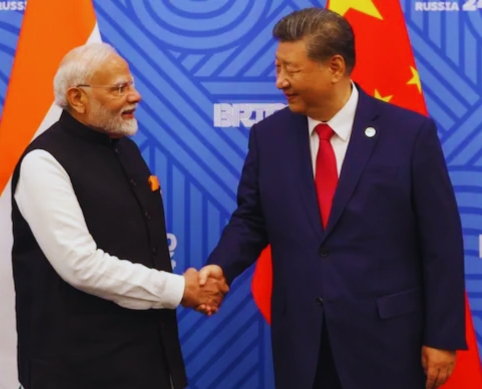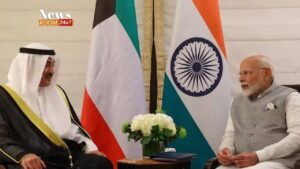PM Modi and Xi finalize LAC agreement, committing to restore relations

The significant agreement reached between India and China this week to resolve one of the longest military standoffs in recent history received formal approval on Wednesday from PM Narendra Modi and President Xi Jinping. This bilateral meeting at the BRICS Summit marked their first encounter in five years, during which they endorsed the deal. According to the Indian side, this endorsement from the highest level is expected to further alleviate tensions along the Line of Actual Control (LAC).
During their 50-minute discussion in Kazan, the leaders agreed to promptly hold Special Representatives (SRs) talks on the India-China boundary issue, which has not occurred since 2019. They emphasized the need to advance relations from a “strategic and long-term perspective,” enhance strategic communication and explore collaborative efforts to tackle developmental challenges.
The Special Representatives, Ajit Doval, and Wang Yi have met multiple times on the sidelines of various multilateral events, including a meeting last month in St. Petersburg, but not within the formal SR talks framework.
In the Indian readout, Modi expressed his support for the agreement concerning complete disengagement and the resolution of issues that emerged in 2020 in eastern Ladakh, which included the deadly Galwan clash that year. He stressed the importance of properly managing differences and disputes to maintain peace and tranquility.
Foreign Secretary Vikram Misri stated that Modi also expressed India’s full support for China’s presidency of the Shanghai Cooperation Organization (SCO) in 2025. China characterized the meeting as constructive and of great significance.
China refrained from using the term “agreement” in its official readout, instead stating that the leaders recognized the “important progress” achieved through extensive communication on pertinent issues in the border areas.
During his opening remarks, Modi expressed, “We believe that the significance of India-China relations extends beyond our two nations. Our partnership is crucial for global peace, stability, and progress.” He emphasized his eagerness for constructive discussions with an open mind and reiterated the three mutuals: mutual trust, mutual respect, and mutual sensitivity, which India has consistently stated should underpin bilateral relations. Over the past five years, India has maintained that normalcy in ties could only be restored through peace and tranquility along the border.
Xi echoed this sentiment, highlighting the necessity for increased communication and cooperation between both sides, as well as the proper management of differences and disagreements to support each other’s development aspirations.
“It is essential for both sides to shoulder our international responsibilities, set an example for enhancing the strength and unity of developing nations, and contribute to promoting multipolarity and democracy in international relations,” Xi stated. He also noted that “specific disagreements” should not impact the overall relationship. The agreement reached this week focused on the Demchok and Depsang regions, which are two friction points where disengagement has yet to be finalized.
The leaders agreed that the Special Representatives (SRs) would convene soon to oversee the management of peace and tranquility in the border areas and to seek a fair, reasonable, and mutually acceptable solution to the boundary issue, as per the Indian readout. It further indicated that relevant dialogue mechanisms at the level of foreign ministers and other officials would also be employed to stabilize and rebuild bilateral relations.









